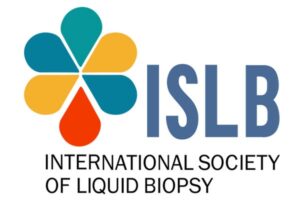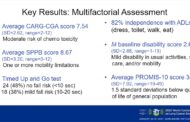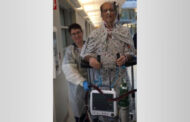 Nurses are an essential part of the revolution of personalized care occurring in oncology. During the 2021 International Society of Liquid Biopsy (ISLB) Congress, Allison Gittens, BSN, RN, OCN, a nurse navigator in thoracic oncology at Greenebaum Comprehensive Cancer Center, University of Maryland, Baltimore, discussed the role of nurses in educating about and advocating for molecular testing for patients with lung cancer.
Nurses are an essential part of the revolution of personalized care occurring in oncology. During the 2021 International Society of Liquid Biopsy (ISLB) Congress, Allison Gittens, BSN, RN, OCN, a nurse navigator in thoracic oncology at Greenebaum Comprehensive Cancer Center, University of Maryland, Baltimore, discussed the role of nurses in educating about and advocating for molecular testing for patients with lung cancer.
“In many cases, molecular testing has changed the landscape of cancer care,” Ms. Gittens said. “It has provided patients with new and better treatment options and given patients and their families new hope.”
Molecular testing has become the backbone of personalized medicine, and the role of the nurse is an essential part of patients having timely access to these services.
Changing Role
Traditionally, the function of nurses has fallen into two buckets, Ms. Gittens said. First, nurses educate the patient and the patient’s family. They provide information to empower patients to make important decisions about their health care and teach patients new skills that can help lead to healthy lifestyle changes. Second, nurses act as advocates, helping patients to navigate the health system.
The role of “molecular” nurses has evolved beyond this traditional role. A molecular nurse is an oncology nurse focused on genetic mutations, molecular testing, and targeted therapies. This specialized group of nurses educate and advocate specifically around the role and usefulness of molecular testing.
“We are the ones patients are coming to with questions, and we must be able to answer those questions so they can make good decisions,” Ms. Gittens said.
Molecular nurses have the capacity to interact with every part of the molecular tumor board. They communicate with radiation oncology, radiology, and other disciplines, and are involved in patient selection for the tumor board. They are engaged in facilitating adherence to treatment standards and often formulate questions to address during the tumor board, Ms. Gittens explained.
Molecular nurses also play a critical role in the practical application of precision oncology. The molecular nurse ensures all work-up is completed before the initial consultation, or shortly thereafter. The nurse plays an active role in presenting to the tumor board, and the nurse educates the patient on the benefits of molecular testing. In addition, molecular nurses are well-qualified to read pathology reports and communicate with the pathology department about specimen viability and testing results.
Molecular nurses are also responsible for obtaining a thorough health and family history, coordinating meetings with the treatment team and genetic counselor, obtaining specimens for testing, and scheduling follow-up visits for their patients.
Growing Role
Molecular nursing will continue to be an essential part of thoracic oncology, as genomic testing is now the standard of care in lung cancer, Ms. Gittens said.
“It is important, when our patients come in, for us to do what is best for them,” she said. “It is our responsibility to provide patients with all the information necessary to make a decision that will positively impact their health care.”
After a diagnosis, molecular nurses often have to explain testing options to patients. The first is molecular testing based on tissue samples. In this case, patients must be told that the results could take 2 to 3 weeks.
“This isn’t an easy pill for them to swallow,” Ms. Gittens said. “We have to help explain how this information can have an impact.”
The second option is the use of liquid biopsy. The results of the liquid biopsy are often available much faster, often within 7 to 10 days. Liquid biopsy is also minimally invasive, and allows for treatment monitoring.
“We get this performed at diagnosis and again when we see disease progression,” Ms. Gittens said. She explained that tissue biopsy and liquid biopsy are complementary and can be done simultaneously.
Barriers
Molecular nurses must also understand the barriers to these tests. Patients may not have insurance coverage, may have too high a co-pay, or may not be able to pay for testing at all. According to Ms. Gittens, most insurance companies in the United States do not completely cover this testing.
Transportation to the blood draw for liquid biopsy testing may also be an issue for some patients. Patients may need to set up transportation for the extra trip this requires, and in many cases, even affording the trip using public transportation may be too much, she said.
Health care literacy and comprehension also play a role in appropriate education about molecular testing. It is the nurse’s role to help patients understand the importance of molecular testing by presenting appropriate information to help them make a decision.
Future of Molecular Nursing
As the role of molecular testing continues to grow, appropriate education for nurses will be key, Ms. Gittens said.
“Patients rely on nurses to educate them,” Ms. Gittens said. “In order for us to provide state-of-the-art care for our patients, nurses are required to understand the terminology, scientific and technological advances, and pharmacogenetics involved in targeted testing and therapy.”
What is not yet known is how to best get nurses this training and education.
“Is it through certification? Extra credit? Do we need a competency training program?” asked Ms. Gittens. “Maybe it should be added to the curriculum of general nursing as an elective or as part of the required curriculum.”
Each of these is a viable option for nurses to learn and understand precision medicine and personalized care. No matter what option is best, implementation will require funding, she added, whether public or private.
“In the future, there is going to be a tidal wave of information coming at nurses,” Ms. Gittens said. “We have to get a handle on this information and technology to be better advocates for our patients.”





